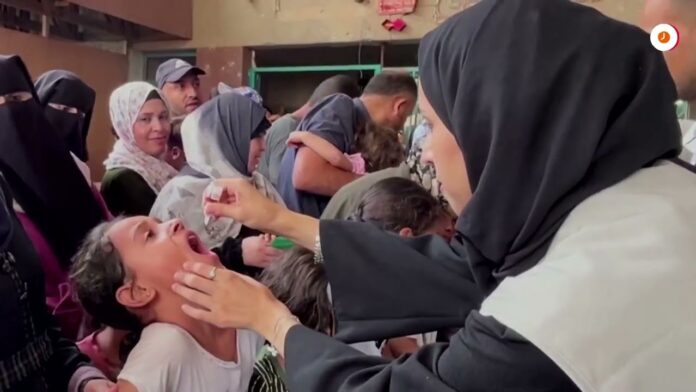The United Nations begins a critical polio vaccination campaign in Gaza, targeting 640,000 children despite ongoing conflict and concerns over ceasefire adherence
On Sunday, the United Nations kicked off a crucial campaign to vaccinate children in Gaza against polio, aiming to protect hundreds of thousands of young lives amid ongoing conflict. The initiative, led by the UN Agency for Palestinian Refugees (UNRWA), targets 640,000 children, representing over 90% of those under the age of 10 in the war-torn region.
The campaign officially commenced a day after a preliminary vaccination phase in Gaza’s central areas. UNRWA has coordinated the campaign with a series of agreed pauses in the fighting, facilitated by Israel, to allow vaccination teams access to the most vulnerable populations.
Deputy Health Minister Yousef Abu Al-Reesh addressed the media during the campaign’s launch, stressing the need for a “real ceasefire” to ensure the campaign’s success. “Our teams are committed to reaching every child who needs this vaccination, despite the risks,” Abu Al-Reesh said. “However, for this campaign to work, we need a ceasefire. Polio does not respect borders and can spread rapidly.”
The vaccination campaign is scheduled to unfold over three periods, from September 1 to September 12. Despite these efforts, there are concerns that the Israeli military might not fully honour the agreed pauses in fighting, potentially jeopardizing the vaccination drive. Reports suggest that the IDF’s standard practice involves targeting Hamas positions regardless of humanitarian pauses.
UNRWA’s Commissioner-General Philippe Lazzarini emphasized the urgency of the situation in a statement on X (formerly Twitter), noting the critical need to reach over 600,000 children promptly. “For this to work, all parties must respect the temporary area pauses. A lasting ceasefire is urgently needed,” Lazzarini stated.
The World Health Organization’s Director-General Tedros Adhanom Ghebreyesus also highlighted the importance of peace for the success of the vaccination campaign. “Children in Gaza are receiving essential polio vaccines today. Ultimately, peace is the best vaccine for these children,” Ghebreyesus wrote.
The resurgence of polio in Gaza reflects the severe impact of over 10 months of Israeli bombardment. The virus, which had been largely eradicated in the region, was detected in sewage samples in June, and a baby was subsequently diagnosed with polio— the first case in Gaza in 25 years. Before the conflict, Gaza had near-universal vaccine coverage, but this has now fallen below 90%.
Polio is a highly infectious disease that primarily affects children under five, causing irreversible paralysis and potentially death. There is no cure for polio, making vaccination the only effective preventive measure.
The vaccination drive is occurring amid reports of Israeli attacks on humanitarian aid convoys. One incident involved an Israeli strike on a vehicle transporting aid, resulting in the deaths of several employees from a transportation company. The Israeli military claimed the strike targeted armed individuals who had commandeered the convoy.
Analysis:
Political:
The UN-led polio vaccination campaign in Gaza is both a humanitarian and political challenge. Politically, the campaign is a response to the resurgence of polio, an indicator of the severe disruption caused by ongoing conflict. The need for a ceasefire to enable the vaccination drive highlights the complexities of negotiating humanitarian access amid hostilities. The campaign also places pressure on all parties involved to adhere to temporary pauses in fighting, raising questions about the feasibility and enforcement of such agreements.
Social:
The vaccination campaign underscores the urgent need to address the health crisis exacerbated by prolonged conflict. Socially, the return of polio is a stark reminder of the broader humanitarian issues facing Gaza’s population. The drive aims to protect children from a preventable disease, but it also reflects the broader struggles of families living under the strain of conflict and instability. The campaign’s success is crucial not only for public health but also for restoring some semblance of normalcy to affected communities.
Racial:
The impact of the polio outbreak and vaccination campaign intersects with racial and ethnic dynamics in the region. The conflict between Israelis and Palestinians has broader implications for how health crises are managed and perceived. The vaccination drive, while focused on protecting Palestinian children, also highlights the disparities in healthcare access and the challenges of implementing health interventions in a conflict zone. The international community’s response to the crisis may be influenced by these racial and ethnic tensions, affecting the overall effectiveness of the campaign.
Gender:
The polio vaccination campaign, while not gender-specific, affects children regardless of gender. However, the broader conflict’s impact on gender roles and responsibilities is significant. Women, often primary caregivers, face additional challenges in ensuring their children’s health amid ongoing violence and instability. The campaign may indirectly address gender-related disparities by focusing on the health needs of all children, but the broader societal impacts of the conflict continue to affect women and families in complex ways.
Economic:
The polio vaccination drive is part of a broader effort to address the health impacts of the conflict, but it also has economic implications. The disruption of healthcare services and the need for international aid underscore the economic strain on Gaza’s health infrastructure. Additionally, the conflict’s impact on economic conditions affects the ability to deliver and sustain such health interventions. The successful implementation of the vaccination campaign relies on both international support and the effective management of resources amidst ongoing conflict.
